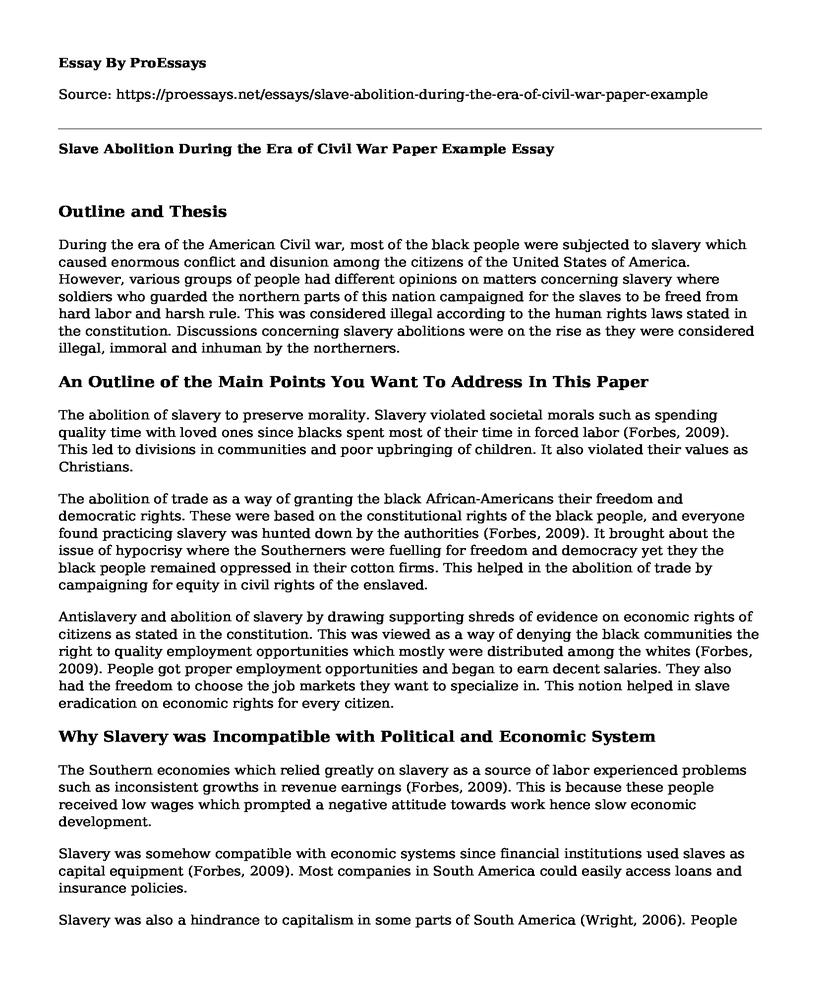Outline and Thesis
During the era of the American Civil war, most of the black people were subjected to slavery which caused enormous conflict and disunion among the citizens of the United States of America. However, various groups of people had different opinions on matters concerning slavery where soldiers who guarded the northern parts of this nation campaigned for the slaves to be freed from hard labor and harsh rule. This was considered illegal according to the human rights laws stated in the constitution. Discussions concerning slavery abolitions were on the rise as they were considered illegal, immoral and inhuman by the northerners.
An Outline of the Main Points You Want To Address In This Paper
The abolition of slavery to preserve morality. Slavery violated societal morals such as spending quality time with loved ones since blacks spent most of their time in forced labor (Forbes, 2009). This led to divisions in communities and poor upbringing of children. It also violated their values as Christians.
The abolition of trade as a way of granting the black African-Americans their freedom and democratic rights. These were based on the constitutional rights of the black people, and everyone found practicing slavery was hunted down by the authorities (Forbes, 2009). It brought about the issue of hypocrisy where the Southerners were fuelling for freedom and democracy yet they the black people remained oppressed in their cotton firms. This helped in the abolition of trade by campaigning for equity in civil rights of the enslaved.
Antislavery and abolition of slavery by drawing supporting shreds of evidence on economic rights of citizens as stated in the constitution. This was viewed as a way of denying the black communities the right to quality employment opportunities which mostly were distributed among the whites (Forbes, 2009). People got proper employment opportunities and began to earn decent salaries. They also had the freedom to choose the job markets they want to specialize in. This notion helped in slave eradication on economic rights for every citizen.
Why Slavery was Incompatible with Political and Economic System
The Southern economies which relied greatly on slavery as a source of labor experienced problems such as inconsistent growths in revenue earnings (Forbes, 2009). This is because these people received low wages which prompted a negative attitude towards work hence slow economic development.
Slavery was somehow compatible with economic systems since financial institutions used slaves as capital equipment (Forbes, 2009). Most companies in South America could easily access loans and insurance policies.
Slavery was also a hindrance to capitalism in some parts of South America (Wright, 2006). People used the slave trade as a measure of their economic status and these distracted their roles in political developments and more.
The Driving Forces of the Civil War
Slavery was the major issue which led to the brewing of civil wars. The South relied on slavery for labor to work the fields. Many people in the North believed that slavery was wrong and evil. These people were called abolitionists. They wanted slavery made illegal throughout the United States. In the process, conflicts ensued between the Northerners and the Southerners.
Election of Abraham Lincoln as President of the United States of America. Abraham Lincoln was a member of the new anti-slavery Republican Party. He managed to get elected without even being on the ballot in ten of the southern states.
The succession when Lincoln was elected, many of the southern states decided they no longer wanted to be a part of the United States. They formed movements against slavery.
Conclusion
Slave abolition was voted against during the era of civil war but many people formulated anti-slavery movements with the view that forced labor was immoral, illegal and inhuman. The goal was to protect and preserve human rights by ensuring that everyone had political and legal representation.
References
Filler, L. (2017). The crusade against slavery: 1830-1860. Routledge.
Forbes, R. P. (2009). The Missouri Compromise and Its Aftermath: Slavery and the Meaning of America. Univ of North Carolina Press.
Wright, G. (2006). Slavery and American economic development. LSU Press.
Cite this page
Slave Abolition During the Era of Civil War Paper Example. (2022, Oct 03). Retrieved from https://proessays.net/essays/slave-abolition-during-the-era-of-civil-war-paper-example
If you are the original author of this essay and no longer wish to have it published on the ProEssays website, please click below to request its removal:
- How Enlightenment Influences Industrial Revolution - Essay Sample
- Pearl Harbor - Movie Review
- Media and Foreign Policy During the Berlin Wall Events
- Questions and Answers About Derek Black Paper Example
- Essay Sample on Amy Beach: Revolutionary American Composer & Pianist
- The Mexican-American War: An Unprepared Mexican vs. U.S. President Polk - Essay Sample
- Essay Example on Manifest Destiny & Alexander Graham Bell: Pioneering the American Missionary Association







